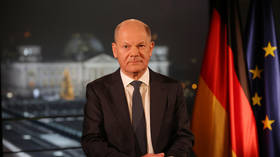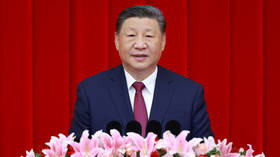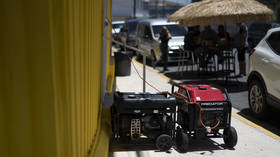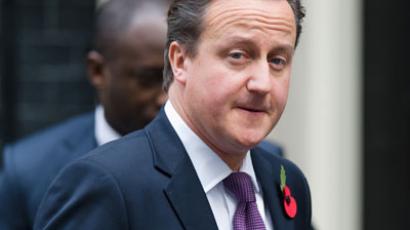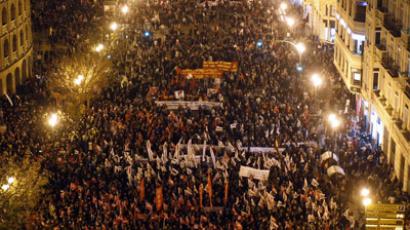EU budget talks: Leaders locked in bitter bargaining
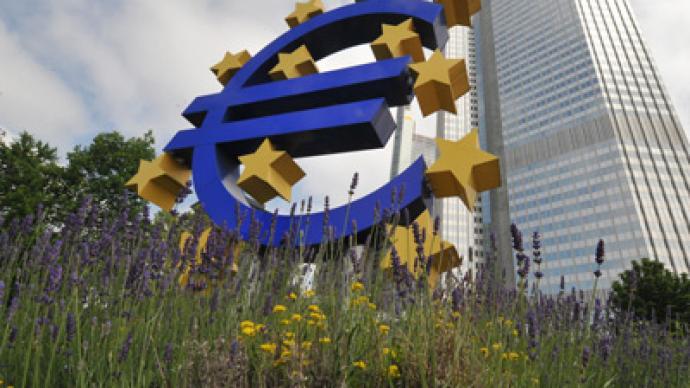
Stark differences of opinion between the EU's major economies have left the first day of budget talks in Brussels in limbo, prompting fears that no agreement will be penned.
Concluding the first day of the summit, German Chancellor Angela Merkel said she doubted that an agreement on the budget could be reached this week."I believe that the positions are quite far apart, in certain respects," Merkel said. "I believe that we will move forward a little tomorrow, but I have my doubts that we will achieve a result."The talks will resume Friday and could extend into the weekend, but there is a “high likelihood” that a second-stage summit would have to be scheduled for February, Merkel said.Analysts meanwhile doubt that any real growth can come from Brussels. Steven Woolfe, the UK Independence Party's financial services spokesman, told RT that “defending a failed system” will not help in “achieving growth for the European continent in the future.” “This is a battle between the rich and the poor,” Woolfe said. “But actually it’s the rich who are the Brussels mandarins demanding more for themselves and more money for them to spend. And it’s the poor people of Europe, the 50 per cent unemployed youth in Spain, those starving in Greece, the people rioting in France and Portugal – they are the ones that are suffering for the greed of the Brussels mandarins.”The draft budget–officially called the Multi-Annual Financial Framework – (MFF) was proposed by European Council President Herman Van Rompuy, who tailored the European Commission's original plan in order to find a compromise for both richer and poorer nations.Eight of the so-called contributor nations including Austria, Britain, Denmark, France, Finland, Germany, Netherlands and Sweden are calling for further spending cuts, though they have different views on what should be cut or by how much. Sweden and the Netherlands backed freezing of the budget, while the UK took the toughest stance as the Prime Minister David Cameron had insisted he will veto any increase in the EU budget. “At a time when we're making difficult decisions at home over public spending, it would be quite wrong, it is quite wrong, for there to be proposals for this increased extra spending in the EU. So we're going to be negotiating very hard for a good deal for Britain's taxpayers and for Europe's taxpayers, and to keep the British rebate,” Cameron said on Thursday as he arrived for a preliminary meeting with Herman Van Rompuy. . But Britain welcomed a proposal made last week by Van Rompuy for a 75-billion-euro decrease in the budget that would leave Britain's rebate intact.“The UK is still a very large contributor to the EU budget. It sponsoring many EU programs that it does not really like. Perhaps a certain repatriation of EU projects which is high on the agenda in the UK will also be reasonable and even better than simply having cuts of the budget or freezing the budget as it is,” Dr. Michael Wohlgemuth, director Open Europe Berlin policy group, told RT. “The gap between member states has increased dramatically because of the European crisis. That has simply shown the huge differences in competitiveness. This time for the first time there is no German-French deal as before on agricultural spending and so on. That shows that the divide is rather large indeed,” Wohlgemuth added.Meanwhile net recipient countries, including Poland, Portugal, Bulgaria, Czech Republic, Estonia, Greece, Hungary, Latvia, Lithuania, Malta, Romania, Slovakia, Slovenia and most recently Spain want spending maintained at the current level or even raised. These countries oppose cuts of the so-called EU cohesion spending aimed at improving infrastructure in the poorer regions. The cohesion payments are the second major item of the 1trn budget, totaling 309.5bn euro or about 32% of the budget.Agriculture subsidies are another bone of contention as it is the biggest item in the EU budget, accounting for 364.5bn euros or 37.5%. France opposes any cuts in agriculture subsidies with President Francois Hollande vowed "to fight" to keep the subsidies at the current level.Even the EU Commission President, Jose Manuel Barroso, complained about the pressure for cuts, "No one is discussing the quality of investments, it's all cut, cut, cut."European leaders will wrangle about the budget through Friday or even longer, as many of them doubt that differences can be bridged. German Chancellor Angela Merkel said another summit may be necessary early next year should the bloc's leaders fail to agree on a 2014-2020 spending plan by the weekend. “I don't know if we will have a definitive deal tomorrow or the next day. We want that," Mrs Merkel told lawmakers during a debate on Germany's own budget. "If necessary, we will have to meet again at the beginning of next year."Meanwhile, Van Rompey pledged to propose "a revised version" of the budget plan when leaders begin the two-day talks in an attempt to find a compromise for all countries. "Let there be no mistake: the absence of an agreement would be harmful for all of us," he said in a summit invitation letter to the EU's 27 leaders.Any of the 27 countries can veto the budget, and the European Parliament will also have to vote on the union’s spending plan even if a deal is reached.


